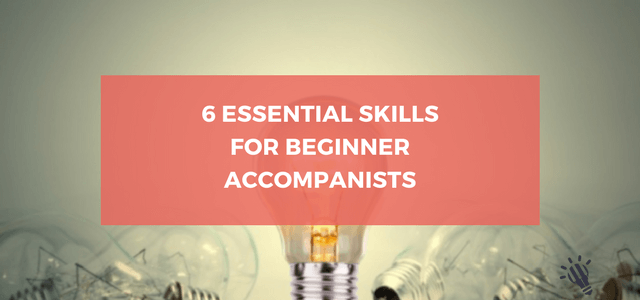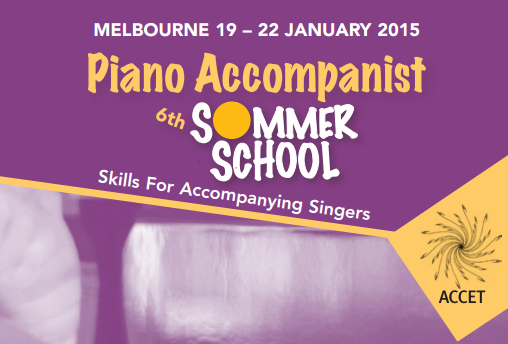
Guest poster Robin Baker, one of Melbourne’s most experienced accompanists, has put together a list of skills that are a focus of her own practising, rehearsing and performing with other artists.
Collaborative Pianists (as the role of accompanists is increasing becoming known) require specialised skills very different to solo performers: following somebody else’s pace, balancing sound level, adjusting for changes to performance on the fly, playing at different speeds and in different keys, giving clear indications of tempo changes, breathing starts and ends, etc. etc,
In fact, it’s becoming such a recognised field in its own right, that there is even a Collaborative Piano blog which may be of interest to readers.
Many teachers are likely already supplementing their income by accompanying students for exams and performances; if you’re not, then I’d strongly encourage you to consider making accompanying a part of your teaching, if you have time.
Not only does being a collaborative pianist offer you extra income, the regular performance opportunities will force you to practice and the work you do with other performers and students will hone your understanding of interpretation and significantly broaden your repertoire.
On a personal note, I’ve been an accompanist for almost as long as I’ve been a pianist. I believe it’s contributed significantly to my sight-reading skills, my ability to play with just about any group of instrumentalists and my ability to improvise in any style. I can also say that accompanying has been a huge contributor to my approach to Robin’s ‘essential skill’ Number 4 (see below).
Today’s article is a quick summary of 6 of the essential skills required of a pianist looking to break into accompanying. While this necessarily a basic overview (a detailed article on accompanying in all its forms and with all its associated skills could easily fill many books), it gives a great summary of some of the most important considerations.
As Robin says, while becoming an effective accompanist can seem like a huge challenge,
All you have to do is choose one skill and work on it. By focusing in this way you are creating a routine for your own practice and rehearsing. Good routines are effective.
If you’re interested in sinking your teeth into the detail of effective accompanying and if you’re in Melbourne in January, make sure you enrol in the Accompanists’ Summer School to be held at Xavier College. More details below.
Over to you, Robin!
1. Develop a strong sense of pulse. E.g. for a piece in 44, play it aiming for 2 main beats in a bar. Sounds obvious I know. Yet this approach is often left far too late in the process of learning a piece. Also, a great side effect of practising this way is you learn much faster and more thoroughly. Give it a go and notice what happens.
2. Develop a good legato – all top pianists have a beautiful legato technique. One way to improve your legato is to improve flexibility of the thumb. Graham Fitch’s YouTube lesson illustrates this very clearly [Look from 3’40” in video].
3. Know the rhythm of the instrumental or voice part. E.g. Sing (“La-la”) the instrumental line out loud as you play the piano part. Start off by doing this for a bar or two at a time. You don’t need to sing the tune, just articulate the rhythm.
4. Learn more about typical harmony progressions E.g. Look out for chords I, IV, V in classical pieces you’re playing. Learn one typical pop song progression. Sounds basic but it works by quickening your awareness of the harmonic flow of a piece.
5. Breathe the upbeat. E.g. At the start of each piece, practise breathing the upbeat before you play the first note. Continue this through for the beginnings of each section of the piece as you’ll need to do this naturally in correlation with the other performer for effective beginnings.
6. Don’t be afraid to simplify – particularly when accompanying a concerto and playing the orchestral reduction. E.g. Play single notes instead of the written octaves. Decide which notes to play and mark this clearly in your score. When it asks you to play a chord with 6+ notes in one hand, forget it! Simplify, simplify, simplify.
 What do I do next?
What do I do next?Choose one skill you want to improve in your own playing. Pick any one – one is no more important than another at this stage. Practise this skill by applying it to all the pieces and technique you are working on. Practise it in rehearsals with your duo partner. If you think it may help you, find a good specialist teacher and search out training opportunities.
I’ve found the secret is focusing on one skill at a time. Try one skill per week, per fortnight or per month. See what works best for you. Notice what keeps you on target and motivated. Then repeat it!
Keep in mind that The Piano Accompanist Summer School is coming up soon in January 2015. Make sure you get involved if you’re interested in improving your skills – we all know that there is no substitute for hands-on experience when it comes to instrumental work.
I look forward to hearing your stories.
What is the most challenging thing for you about accompanying?

Jack Ryan says:
I was about to give up the piano. For 10 years, I spent many hundreds of dollars and a lot of time with scales and all this entails.
Progress was extremely slow and at times it felt like a battle with no end.
Now, thanks to some simple exercises I came across, I’ve picked up more in a few days than with the all the other methods I’ve tried.
I’m playing songs I never thought I’d play and can’t wait to see how far I can go.
If anyone’s interested, this is what helped me:
http://www.bestquicktips.com/play-piano-like-a-pro
Julia says:
Very good point. We- classical accompanist are used to adjusting to the performers but if yo clearly state that you want to keep the tempo, then it should not be any problem. Good luck!
George Power says:
I am a beginner at accompanying children singing at my church(I am 75) & it doesn’t seem to matter how well I think I know the hymn or chorus I invariably falter & don’t play as well as when practicing alone. What is your best advice to me in this situation. We have lost 3 pianists in the last year & I am just trying to help in the situation & wish to be far more successful. Thanks George power
Tim Topham says:
Hi George. Firstly, don’t be too hard on yourself! Performing in any sphere will always create unexpected holes to appear in your practice. As long as you keep going, maintain the pace and support the singing, that’s what matters in a church setting. I’ve accompanied services all my life and regularly make mistakes! I know that the congregation will be supportive as it sounds like you’re just doing your best and helping out given the problems with finding a pianist.
For your practice, you might like to try playing along to recordings of the hymns to practice keeping going and getting used to playing while people are singing?
Elizabeth says:
Hello, I like your blog and I’m hoping you can help me with an issue I’m/we’re having. I am a jazz vocalist who has just started working with a clasicly trained pianist as acompinist. The issue were having: when I want lay something back she goes with me, so I slow down to lay back further and she slows down until we end up with a duirge. I have asked her to keep tempo but she says it’s her job to stay with me. When I do that I end up having to sing t straight ahead and it sounds….straight 🙂 I don’t know how to communicate to her. Do you have any ideas for us? I really like working with her, we just this one little hiccup. Thank you! Elizabeth
Robin says:
You articulate the issue very clearly Elizabeth. And raise a common problem. Two things come to mind. 1. You explain the situation with clear language and good examples here – have you said exactly this to your accompanist? If not, do. 2. Record part of your rehearsal and play it back listening together. I find the quickest way to the true music is to brave the play back!
Wish you every success. Let me know how you get on 🙂 Thanks for your input – valuable
Tim Topham says:
HI Grazina. I’ll let you know when the next event is released. Just make sure you’re subscribed to the blog!
Grazina says:
“Keep in mind that The Piano Accompanist Summer School is coming up soon in January 2015”
. So when it will be? Maybe 2016?